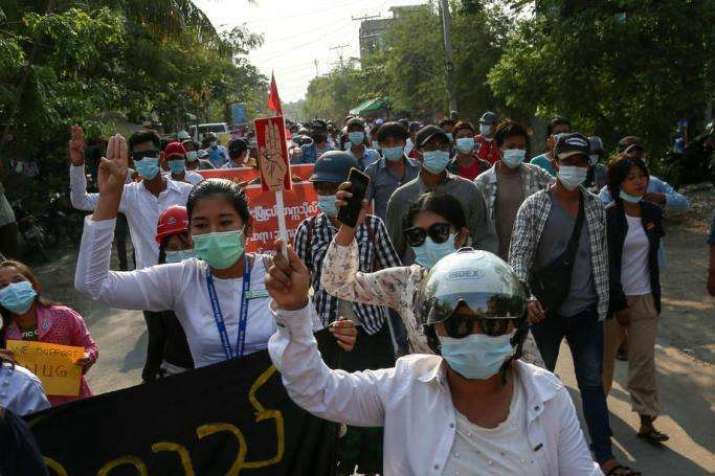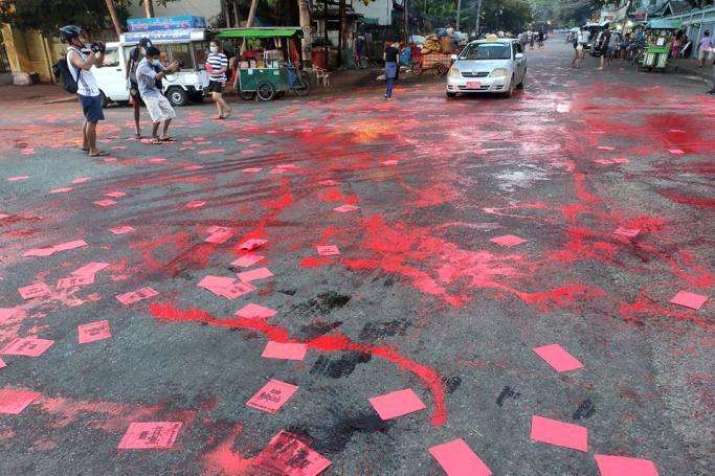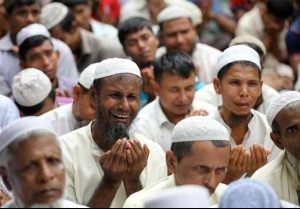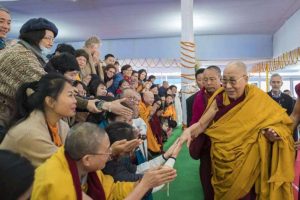
Seeking to maintain pressure on the military junta during the country’s most important holiday of the year, pro-democracy activists across Myanmar observed silent strikes, memorials, and protests over the recent Thingyan Buddhist New Year festival. The holiday period, which began on 13 April, was nevertheless punctuated by violence that media reports said led to the deaths of at least 26 citizens in a climbing toll that has exceeded 700 killed since 1 February.
The number of dead reported over the holiday period is expected to increase as people were still missing and several others were gravely wounded and their survival was uncertain, The Irrawaddy website reported.
Protestors called for a day of silence to commemorate the victims of the military crackdown, as well as a day of religious observance on Saturday, the first day of the traditional new year. Buddhists were urged to wear traditional attire and recite prayers, while Christians were encouraged to wear white and recites psalms, and the followers of other religions were urged to heed their spiritual leaders.
Many protestors chose to remain at home on Friday to mourn those killed protesting against the 1 February military coup, while those who protested outside did so silently in small rallies in towns and cities across the country.

“Let’s make the roads silent,” protest leader Ei Thinzar Maung posted on her Facebook page. “We have to stage a Silent Strike to show our sorrow for the martyrs who have sacrificed their lives. The most silent voice is the loudest.” (TRT World)
The mood was reported to be somber in the days leading up to Saturday, with few signs of the usual public festivities. Instead of the popular water fights, protestors spread red paint over the streets of the country’s largest city and former capital Yangon to symbolize the recent bloodshed, while protesters elsewhere across the country wore red in solidarity.
“Now is like a funeral wake for the whole country because of the atrocities of the military junta. More than 700 people have died because of their brutality. This is not a time for celebrations,” a young man from Yangon who identified himself as “Harry” was quoted as saying. “We’re not celebrating Thingyan as we traditionally do. We’re holding various campaigns to defy them.” (Radio Free Asia)
Thingyan, a five-day Lunar New Year festival, is typically celebrated through visiting Buddhist temples and pagodas, the ritual cleaning of Buddha images, and high-spirited water battles in the streets, along with family gatherings and celebrations. Similar festivals are observed in Cambodia, Laos, and Thailand. This year’s subdued atmosphere marks the second consecutive year that this major Buddhist holiday has been disrupted. Restrictions due to the COVID-19 pandemic forced the cancellation of most public events last year.
https://www.facebook.com/etzm.dpns/posts/489117389197937
Myanmar is a predominantly Theravada Buddhist country, with 88 per cent of the population of roughly 60 million people identifying as Buddhists, according to census data for 2014. Christianity, folk religions, and Islam represent the remainder. Buddhist monks, venerated throughout Burmese society, are estimated to number in excess of 500,000, with some 75,000 Buddhist nuns in this Southeast Asian nation.
UN High Commissioner for Human Rights Michelle Bachelet last week called for immediate and decisive measures to compel the military junta to halt its campaign of repression and violence against the people of Myanmar.
“We have witnessed yet another weekend of coordinated bloodshed in many parts of the country, including the reported mass killing of at least 82 people in Bago between Friday and Saturday [9–10 April]. The military seems intent on intensifying its pitiless policy of violence against the people of Myanmar, using military-grade and indiscriminate weaponry,” said Bachelet. “I fear the situation in Myanmar is heading towards a full-blown conflict. States must not allow the deadly mistakes of the past in Syria and elsewhere to be repeated.” (OHCHR)
Myanmar’s military declared a year-long state of emergency on 1 February, after detaining President Win Myint, State Counselor Aung San Suu Kyi, and other senior members of the governing National League for Democracy (NLD) party. The coup d’état took place just hours before the country’s new parliament was due to convene following a general election in November last year, during which the NLD made substantial electoral gains.
Suu Kyi, who served the country from 2016–21 following a long struggle for democracy that overturned decades of military rule, remains under house arrest and is facing a growing litany of charges from the coup leaders in an apparent attempt to provide a legal veneer for her detention. Before leading the civilian government, Suu Kyi, now 75, spent almost 15 years under house arrest for her efforts to bring democracy to Myanmar.
The military, which had backed the parliamentary opposition in the national election, has asserted that it staged the coup in response to electoral fraud, however the national election commission has said there is no evidence to support these claims. The NLD won around 80 per cent of the available parliamentary seats in last year’s vote.
Since seizing power, the self-styled State Administration Council (SAC), led by military commander-in-chief General Min Aung Hlaing, has unilaterally amended the country’s treason and sedition legislation in an apparent bid to secure impunity for the coup leaders.
A nationwide civil disobedience movement (CDM) has quickly gathered pace in the wake of the coup, with hundreds of thousands of people protesting in towns and cities across the country, denouncing the military and calling for the release of detained civilian leaders. The CDM movement, which began with medical personnel, has been taken up by teachers, engineers, railway workers, bank staff, and even some members of the police force, who have on some occasions beeen witnessed switching sides to join the protestors.
Myanmar Regime Detains, Tortures Yangon Residents After Bombing of Govt Office https://t.co/mT3E1SKaH5#WhatsHappeningInMyanmar
— The Irrawaddy (Eng) (@IrrawaddyNews) April 19, 2021
——————–
Help The Irrawaddy Report the Truth from Myanmarhttps://t.co/PaJUd0gH3P
“As of 18 April, 737 people are now confirmed killed by this junta coup,” the Assistance Association for Political Prisoners (AAPP), a human rights organization based in Thailand and Myanmar, reported in a daily update. “This is the number verified by AAPP; the actual number of fatalities is likely much higher. We will continue adding as and when.”
The AAPP also reported that a total of 3,229 people had been placed under detention, of whom 75 had been sentenced, with 20 people sentenced to death.
See more
Anti-coup citizens in Myanmar hold silent strike during Buddhist holiday (TRT World)
New Year junta crackdown as people cautiously mark the holiday (Mizzima)
Myanmar activists promise protests during Buddhist Thingyan festival (The Standard)
Myanmar Junta Turns Auspicious New Year into Nightmare of Bloodshed (The Irrawaddy)
Myanmar Protesters Swap New Year Blessings for Anti-Junta Statements (Radio Free Asia)
Intensifying widespread, systematic slaughter by Myanmar military must be halted – Bachelet (OHCHR)
Daily Briefing in Relation to the Military Coup (Assistance Association for Political Prisoners)












